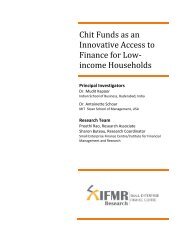Government of India Volume I: Analysis and Recommendations
Government of India Volume I: Analysis and Recommendations
Government of India Volume I: Analysis and Recommendations
You also want an ePaper? Increase the reach of your titles
YUMPU automatically turns print PDFs into web optimized ePapers that Google loves.
STRUCTURE OF THE REGULATOR<br />
Table <strong>of</strong> <strong>Recommendations</strong> 3.3 Types <strong>of</strong> members on the board <strong>of</strong> the regulator<br />
1. Chairperson <strong>of</strong> the board<br />
2. Executive members, including a set <strong>of</strong> designated administrative law members<br />
3. Non-executive members<br />
4. <strong>Government</strong> nominees<br />
this category <strong>of</strong> members, some persons will be designated as administrative law members. Administrative<br />
law members will be responsible for:<br />
(a) Reviewing the performance <strong>and</strong> carrying out the oversight <strong>of</strong> a designated set <strong>of</strong> employees<br />
<strong>of</strong> the regulator, referred to as administrative law <strong>of</strong>ficers; <strong>and</strong><br />
(b) Reviewing the decisions taken by the administrative law <strong>of</strong>ficers.<br />
The executive members will devote their entire time to the management <strong>of</strong> the regulator <strong>and</strong> will<br />
not be permitted to take up any other employment during their appointment. These members<br />
will be responsible for the oversight <strong>of</strong> the regulator’s personnel, except for administrative law<br />
<strong>of</strong>ficers who will be monitored only by administrative law members.<br />
3. Non-executive members - This category will consist <strong>of</strong> persons who are experts in the fields <strong>of</strong><br />
finance, law, economics, etc., <strong>and</strong> are appointed to the board on a part-time basis. They will<br />
not be involved in the day to day functions <strong>of</strong> the regulator. Non-executive members may take<br />
up other engagements but will have to manage conflict <strong>of</strong> interest issues when participating in<br />
board meetings.<br />
4. <strong>Government</strong> nominees - The <strong>Government</strong> will have the right to nominate ex-<strong>of</strong>ficio members<br />
on the board <strong>of</strong> the regulator. These members will represent the perspective <strong>of</strong> their departments/ministries<br />
or other regulators in the functioning <strong>of</strong> the regulator.<br />
The Commission believes that it is crucial for the draft Code on regulatory governance<br />
to lay down the functions <strong>and</strong> powers <strong>of</strong> each type <strong>of</strong> member on the board <strong>of</strong><br />
a regulator. Accordingly, the law will state that the chairperson <strong>and</strong> executive members<br />
are responsible for the day to day functioning <strong>of</strong> the regulator. The role <strong>of</strong> the administrative<br />
law members will be to focus on the regulator’s adjudication <strong>and</strong> administrative<br />
law functions. Having a category <strong>of</strong> non-executive members is a continuation <strong>of</strong> the<br />
present system <strong>of</strong> appointing part-time members on the boards <strong>of</strong> financial regulators.<br />
Such non-executive members will provide two important benefits to the management <strong>of</strong><br />
the regulator:<br />
1. Since they will not be employees <strong>of</strong> the regulator, it is expected that they will be neutral observers<br />
in the functioning <strong>of</strong> the regulator <strong>and</strong> alert the <strong>Government</strong> <strong>of</strong> any violations <strong>of</strong> law by the regulator.<br />
2. Such members should have expertise in finance <strong>and</strong> allied fields, <strong>and</strong> preferably also some experience<br />
in providing financial services. This will bring in expertise <strong>and</strong> information about the<br />
financial sector to the board <strong>of</strong> the regulator.<br />
Unlike ordinary civil servants, board members are appointed for a limited time <strong>and</strong><br />
do not have a guarantee <strong>of</strong> continued employment. Therefore, one <strong>of</strong> the crucial requirements<br />
<strong>of</strong> independence is that the members should be protected from pressure through<br />
change in their terms <strong>of</strong> appointment.For this reason, the Commission recommends that<br />
the draft code should provide the conditions <strong>of</strong> appointment <strong>of</strong> members - duration, entitlements,<br />
system <strong>of</strong> removal <strong>and</strong> conflicts <strong>of</strong> interests (see Table 3.4).<br />
3.3. Functioning <strong>of</strong> the board<br />
The functioning <strong>of</strong> the board <strong>of</strong> regulators should primarily be left to the rules <strong>and</strong> regulations<br />
formed by the regulator. However, in the interest <strong>of</strong> accountability, certain principles<br />
must be laid down to govern the actions <strong>of</strong> the board. The Commission is <strong>of</strong> the opinion<br />
that best practices <strong>of</strong> conducting the functions <strong>of</strong> deliberative bodies should be incorporated<br />
in the functioning <strong>of</strong> the regulator. The recommendations with regard to what<br />
should be contained in the draft Code to govern board meetings is provided in Table 3.5.<br />
FINANCIAL SECTOR LEGISLATIVE REFORMS COMMISSION 23



